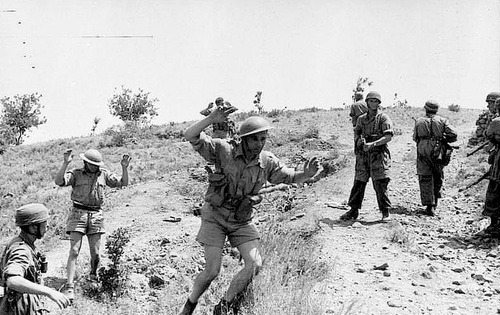Auction: 17001 - Orders, Decorations and Medals
Lot: 216
An unusual Second World War fall of Crete P.O.W's campaign group of seven awarded to Private W. Morrison, Royal Military Police, late Bedfordshire & Hertfordshire Regiment
General Service Medal 1918-62, 1 clasp, Palestine (6087816 Pte. W. Morrison, Beds. & Herts. R.); 1939-45 Star; Africa Star; Defence and War Medals 1939-45; Korea 1950-53 (22259957 Pte. W. Morrison, R.M.P.); U.N. Korea 1950-54, generally good very fine (7)
A pre-war regular soldier, Morrison was serving in the 1st Battalion, Bedfordshire & Hertfordshire Regiment, in Egypt at the outbreak of hostilities in September 1939. Transferred to the 14th Infantry Brigade of 8th Infantry Division, the Battalion moved to Palestine in November of the same year, where it served for some 16 months on internal security duties. In March 1941, the Battalion deployed to Greece, initially disembarking in Athens. It was then deployed to the defence of the island of Lemnos, from which it was withdrawn to Egypt within two weeks. Morrison, meanwhile, had been detached for duty in Crete, so from a regimental perspective his subsequent part in that campaign is highly unusual.
The Germans launched their airborne attack on Crete on 20 May 1941, deploying a force of 10,000 paratroops. A famously bitter battle ensued, the enemy paratroops suffering heavy casualties, but at length the Allied forces under General Freyberg were pushed back. Between 28 May and 1 June, 18,600 troops were evacuated to Egypt, at great cost to the Royal Navy. Freyberg's remaining 12,000 men were rounded up and taken P.O.W., among them Morrison, who was captured on 2 June.
The suffering endured by the P.O.Ws is well catalogued. In his definitive history, Crete, The Battle and the Resistance, Anthony Beevor describes the deplorable prison camp conditions on the site of a field hospital west of Canea. The Germans showed little interest in their new charges - not even the wounded - many preferring to sunbath naked on the beaches. 'Fortunately for the British prisoners', wrote Beevor, 'the guards' insouciance allowed them to slip out of the camp to forage for food with the help of villagers'.
Of Morrison's exact experiences in this period we know little. Yet we do know that he ended the war as a P.O.W. at Stalag 344 in Poland. As a consequence, he would have endured the notorious 'Lamsdorf Death March' in early 1945, when the camp's weak and ill-prepared inmates were marched away from the advancing Russians: many of them died as a result of the prevailing blizzards and temperatures, the latter sometimes registering as low as -25C.
Placed on the Army Reserve on his eventual repatriation, Morrison was recalled at the time of the Korean War, when he served as a Private in the Royal Military Police in 28 Brigade Provost Section.
Reference sources:
Beevor, Anthony, Crete, The Battle and the Resistance (B.C.A., 2005).
Official casualty lists and returns from T.N.A.: 539, 553 and 657.
Sainsbury, J. D., A Guide to the History of the Bedfordshire & Hertfordshire Regiment (Welwyn, 1987).
Subject to 20% VAT on Buyer’s Premium. For more information please view Terms and Conditions for Buyers.
Sold for
£400







